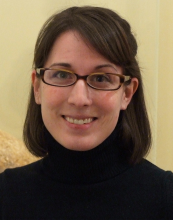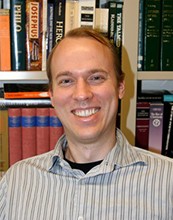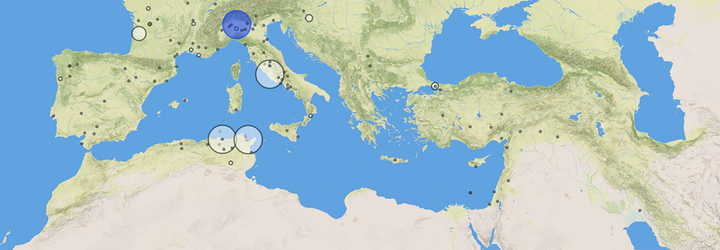The Obermann Summer Seminar is an opportunity for UI faculty members to lead a major collaborative project with a dozen or more visiting participants that will result in some form of publication or public work. The outcome should make a significant contribution to the fields of the participants, whether as a print or digital publication or in another form that promises real impact.
Linking the Big Ancient Mediterranean
June 6–8, 2016
Not so long ago, if you wanted to read The Odyssey, you needed several massive, expensive tomes: the original text, appendices of endnotes, maps, and family trees, maybe even a Greek dictionary. Today, thanks to digital humanists like Sarah Bond (Classics, CLAS) and Paul Dilley (Classics and Religious Studies, CLAS), you can access many classical texts online, for free, with notes about characters, historical figures, places, and words appearing as you mouse over the text, along with maps and network analyses.
Last year, in conjunction with an Obermann Interdisciplinary Research Grant, the two developed the project, Big Ancient Mediterranean (BAM), along with Ryan Horne (History, UNC–Chapel Hill). Though it doesn’t yet feature The Odyssey, the site offers information about a number of Latin texts, from Virgil’s Aeneid to Augustine’s Confessions.

Open-access projects like BAM—that is, free, open-source, publicly accessible online tools—have become essential to digital humanities research, as they allow scholars to collaborate easily and reach a broad audience. “If we’re using closed tools that only certain people can afford,” says Bond, “then our projects will be accessible only to a small group within the academy. Because BAM focuses on texts that a lot of people are interested in—for instance, the Bible—we want it to be public-facing and to integrate academics, students, and the general public.” Dilley adds that digital tools allow scholars to test old hypotheses as well as to generate new material and new perspectives, citing “distant reading” approaches that use algorithms to find patterns within and across texts.
To forge connections between BAM and other digital humanities projects and to give digital scholars working across fields an opportunity to share their expertise and establish best practices for their projects, including a common vocabulary for linked open data, the three organized a public conference, Linking the Big Ancient Mediterranean. The conference featured 11 scholars from across the world who have developed open-source projects that help scholars better study classical texts. These researchers shared their work with 15 fellow scholars of classics, geography, GIS, world languages and literatures, and the spatial humanities, discussing both the advantages and challenges of using linked open data in humanities research.

Twenty presentations covered everything from GIS, mapping, and 3D modeling to the development of open-access archives for literary correspondence and data related to the study of coins and currency.
Bond, Dilley, and Horne hope to publish the proceedings of the conference in an open-access online journal that would provide, in Dilley’s words, “a ‘cookbook,’ or set of instructions, for creating digital projects using linked open data related to the ancient world.” As for BAM, the three plan to use what they’ve learned to improve the usability of the site’s various modules—specifically, to redesign its visual interface and incorporate new functionality (e.g., innovative textual search features in BAM’s Iowa Canon of Latin Authors). They also plan to apply for NEH funding during the next academic year.
View the conference’s lively Twitter feed: page 1, page 2, page 3.
Seminar Participants
- Sarah Bond (Assistant Professor of Classics, CLAS, University of Iowa; Co-PI of BAM)
- Paul Dilley (Assistant Professor of Classics and Religious Studies, CLAS, University of Iowa; Co-PI of BAM)
- Tom Elliott (Associate Director of Digital Programs, ISAW-NYU, Managing Editor and Founder of the Pleiades Project)
- Elton Barker (Reader in Classical Studies, Open University; Community Director of the Pelagios Project)
- Gabriel Bodard (Reader in Digital Classics at University of London; SNAP:DRGN)
- Michael Satlow (Professor of Religious Studies and Judaic Studies, Brown University, Director of IIP)
- Elli Mylonas (Senior Digital Humanities Librarian, Brown University; TEI Expert, Technical Director of IIP)
- Adam Rabinowitz (Associate Professor at UT-Austin, Archaeologist and director of PeriodO)
- Ryan Horne (Postdoctoral Fellow, UNC-CH, Technical Director at BAM)
- Tom Keegan (Head, Digital Scholarship & Publishing Studio, University of Iowa)
- Matt Butler (Senior Developer, Media Production & Design Work, Digital Scholarship & Publishing Studio, University of Iowa)
- Monica Berti (Assistant Professor of DH, Alexander von Humboldt Chair of Digital Humanities, University of Leipzig)
- Elizabeth Platte (Instructional Technologist at Reed College; Digital Humanities Specialist and Project Manager at Coptic Scriptorium)
- Caroline T. Schroeder (Principal Investigator, Coptic Scriptorium, Professor of Religious and Classical Studies, University of the Pacific)
- David Michelson (General Editor, Syriaca.org, Assistant Professor, Divinity School, Vanderbilt University)
- Nico Dogaer (KU Leuven, Ancient History; Trismegistos Project)
- Sara Sprenkle (Associate Professor of Computer Science, Washington and Lee University; Technical Director, Ancient Graffiti Project)
- Ethan Gruber (Director of Data Science at the American Numismatic Society, Nomisma.org software creator)
- Sebastian Heath (Clinical Assistant Professor of Ancient Studies, ISAW-NYU)
- Tom Elliott (Associate Director of Digital Programs, ISAW-NYU; Managing Editor and Founder of the Pleiades Project)
- Stephanie Blalock (DH Librarian, Digital Scholarship & Publishing Studio, University of Iowa; Associate Editor of the Walt Whitman Archive)
- Kyle Johnson (Developer, Classical Language Toolkit)
- Hannah Scates Kettler (DH Librarian, Digital Scholarship & Publishing Studio, University of Iowa)
- Bob Cargill (Assistant Professor of Classics and Religious Studies, CLAS, University of Iowa)
- Ryan Baumann (Duke Collaboratory for Classics Computing, Developer for Papyri.info)
- Samuel J. Huskey (Associate Professor and Chair of the Department of Classics & Letters, University of Oklahoma; Director, Digital Latin Library)
